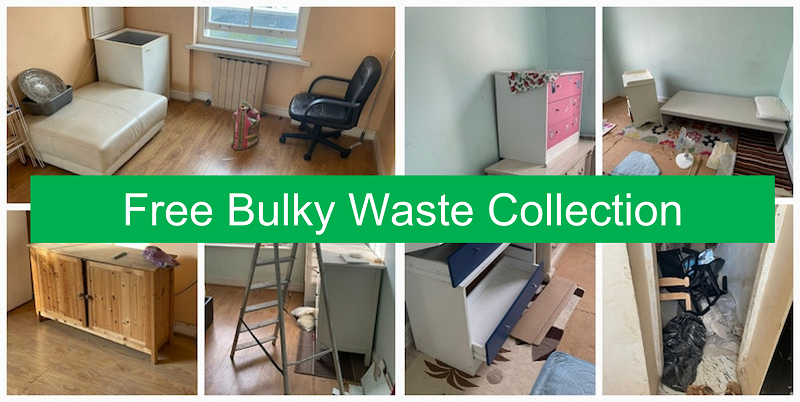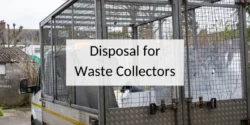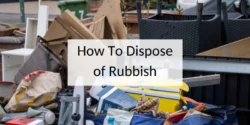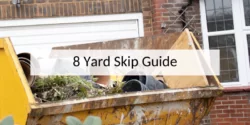How to get your bulky waste collected for free
Free bulky waste collection services and other ways to dispose of bulky waste for free
Looking for free bulky waste collection? This article covers the 5 ways householders can get rid of bulky waste like unwanted furniture, household junk and DIY waste for free. It then covers the paid for disposal options you can consider, if you are unable to find a free solution:
- Scrap metal collector
- House or office clearance
- Reuse - charity donation or donate to an individual
- Local council bulky waste collection service
- Council recycling centres
1. Scrap metal collectors
If your bulky waste contains quite a high proportion of metal, then a scrap metal business will often remove it for free. In fact, sometimes they will even pay you for it! Scrap metal collectors are waste collectors who specialise in metal waste. Because metal has value, their business model is mainly about selling the metal recovered rather than charging customers for the collection.
Therefore, if you have some bulky waste that contains lots of metal, you could get a free collection. Typical items are dishwashers, washing machines, cookers, metal fencing, or tin sheets. That said, scrap merchants are only interested in metal. So, don't expect them to want to take your more general waste at the same time! This will need to be collected through another route.
Top tip! If they are happy to offer a free bulky waste collection for all of your rubbish, then you've probably got some real value in the metal part of it. Copper storage tanks for example can be worth more than £100.
Popular scrap metal household items
The most popular scrap metal items coming out of homes are large domestic appliances. For example washing machines, dishwasher, cooker, and microwaves. Other types of household metal include copper and brass piping and taps, aluminium furniture, lead flushing from roof and gutters, cutlery, metal ladders, metal wheelbarrows, tin cans (including empty paint tins), metal fencing, boilers, copper hot water cylinders, radiators, hot water rails, tanks, and steel baths. Light iron (technically called ferrous) items attract the least value. Copper, brass and aluminium offer more.

Scrap collectors cannot pay you Cash and Must be Licensed
The law changed a few years back to clamp down on illegal operators and scrap metal collectors are no longer permitted to pay people cash. If any payment occurs to the person disposing of metal, the payment must be via bank transfer. So if a collector offers you cash for payment, it's illegal, and you should not do business with them.
Scrap metal collectors need special licenses and one way to make sure is to search the Environment Agency register. Alternatively, use the LoveJunk Marketplace to match with a nearby, licensed collector.
2. House Clearance or Office Clearance
House clearance and office clearance companies offer a free bulky waste collection method ONLY when most of the items they collect are valuable. Like scrap metal collectors, house and office clearance businesses focus primarily on the resale value of the items they clear. Rather than making money for the collection and disposal service itself. They are only really interested in jobs that mainly involve stuff that can be resold, rather than rubbish. Equally, they don't like single or just a few items. They like large multiple van load type jobs.
Lastly, they will always want to come to the property to review all of the items to be cleared to assess how saleable they are and then give you a quote. This takes time which means if speed is of the essence; try a different solution.

Collection by a House clearance company
House clearance companies specialise in clearing homes after a bereavement or when a tenant leaves without paying the rent. Their quote for the job can be a cost, free or a payment. This depends on:
- The quality and number of reusable items in the house
- How much remains to be disposed of after resale/ reuse
For more detail, please check out our house clearance guide.
Collection by an Office clearance company
Similar to house clearance companies, an office clearance company wants to clear an office after business goes bust or upgrades the office furniture. Please read our office clearance guide for more detail, including rates and how to find and choose a decent office clearance company.
3. Charity donation or donation to an individual
Charities
If you have furniture or working appliances to get rid of, charities can provide a free bulky waste collection. They want items in genuinely good condition, without stains or faults. Any upholstered furniture (fabric sofas, for example) MUST have fire labels still intact. Without labels, charities can't legally accept the item. They also can't take messy or dirty waste (DIY, rubble).
The following is a list of nationwide organisations that collect reusable items. Remember that they are charities rather than businesses. You may have to wait much longer for a response and pick up (as opposed to using a man & van collection service, for example).
Charities that collect unwanted furniture for free
- Age UK
- Barnardo's
- Betel UK
- British Heart Foundation
- British Red Cross
- Cancer Research UK
- DEBRA
- Emmaus
- Forces Support
- Oxfam
- Salvation Army
- Sense
- Shelter
- Sue Ryder
- YMCA
Donate to an individual
In other words, give your old items away for free. As with charities, any items you want to donate should be in genuinely good condition without visible wear and tear. You don't need to have fire labels attached to give your upholstered furniture directly to somebody else, so this is a great way to still be generous!
The best way to give your stuff away for free is online. Popular platforms include Freecycle and Freegle. Gumtree and Facebook have sections for Free Stuff. You could also use the LoveJunk marketplace to donate your stuff to an individual.

Use LoveJunk to Reuse
Create a listing on LoveJunk and select 'Reusable'. This notifies reusers as well as licensed waste carriers. If a reuser likes your item, they can offer to collect it for free. The great thing about LoveJunk is that, even if you don't manage to find someone to take your item for free, you can still accept bids from fully vetted waste carriers. So you still get rid of your unwanted items either way.

Increase chances of reuse
- Take good quality pictures from a few angles and preferably taken in daylight
- Include an accurate description. If there are imperfections, let people know! Better to be aware before than to turn up and find out the listing was inaccurate.
- Say why you're getting rid of your item. Are you moving house? Redecorating? A genuine reason makes your listing more trustworthy.
See our articles about How to Donate Furniture and Free Collection of Unwanted Furniture for more advice on this.
Examples of reused items on LoveJunk
4. Local council bulky waste collection service
Almost every council offers a collection service to their residents for items that are too big for wheelie bins. You need to book the service and in most cases, pay for it. If you're lucky, some councils offer a free collection service. There's usually a limit on free collections however, so you'll only be able to book one free collection a year for example. After that, you'd have to pay.
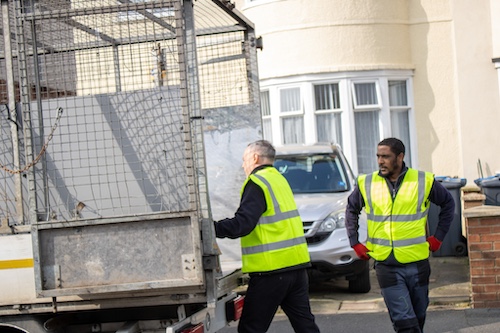
Councils offering free bulky waste collections
18 councils in England offer free bulky waste collections (subject to conditions) as of April 2023.
| Enfield | Harrow |
| Hyndburn | Hull |
| Leeds | Leicester |
| Liverpool | Manchester |
| Middlesbrough | North Lincolnshire |
| Pendle | Reading |
| Redbridge | Rochdale |
| Sunderland | Tower Hamlets |
| Waltham Forest | Wigan |
Remember to check how often you can book a free collection.
If free isn't available, how much does a council bulky waste collection cost?
If your council doesn't offer a free service, the average charge for a single item is £33. Some councils charge a flat fee for a certain number of items; some charge per item. It varies by council and you can be very lucky or unlucky with how much you'll pay!
That being said, most councils also provide discounts to people who receive income support. Sometimes, the discount just means you don't pay full price and sometimes, you can receive a free collection. If this applies to you, be ready to provide proof of benefits when booking.
See our article for more information about individual council large item collection prices.
How does the council service work?
Council collection services tend to be quite basic. Most councils:
- Will only collect bulky waste from outside the property (legal requirement)
- Limit their service to a maximum number of items
- Exclude messy, builder/ DIY waste like bricks, rubble, soil and plasterboard
- Have relatively slow response times - you can wait between 1-4 weeks from booking to collection
5. Council recycling centre
The last option is to do it yourself and take your bulky waste to the council reyccling centre. This isn't technically a 'collection' solution but it is free - so something to consider if you want to save money!
Recycling centres are known by many names: household waste recycling centres (HWRC), civic amenity sites or council rubbish tips. They all mean the same thing and are available to every resident to dispose of stuff that can’t fit in the bin. This is a great option if you have the means of transport and time to load and unload.
Recycling centres accept more types of waste than the council’s bulky waste collection service does. However, it’s important to remember that each HWRC has a list of waste that they accept and prohibit, so don't get caught out. You can find these lists on their websites.
See our map of council recycling centres in England to find your nearest one.

Can you dispose of a sofa at the tip?
Yes! Council tips will take any bulky household item, including mattresses, sofa beds, chest of drawers, fridges and old carpet.
However, the bigger question is arguably “Can I fit my sofa in my car?” or “Do I need to hire a van to carry it?”. Check your council’s website about van access to the recycling centre site – many charge or require permits if you aren’t coming in a car. If this is looking like a lot of fuss, it may be easier to ask the council to collect your sofa, or hire a man & van!
Further reading
We hope you found this post about how to dispose of your bulky waste for free useful! If you don't manage to succeed with any of these free collection methods, don't worry - our How to dispose of rubbish guide has all your options, including price breakdowns and how to save money.



